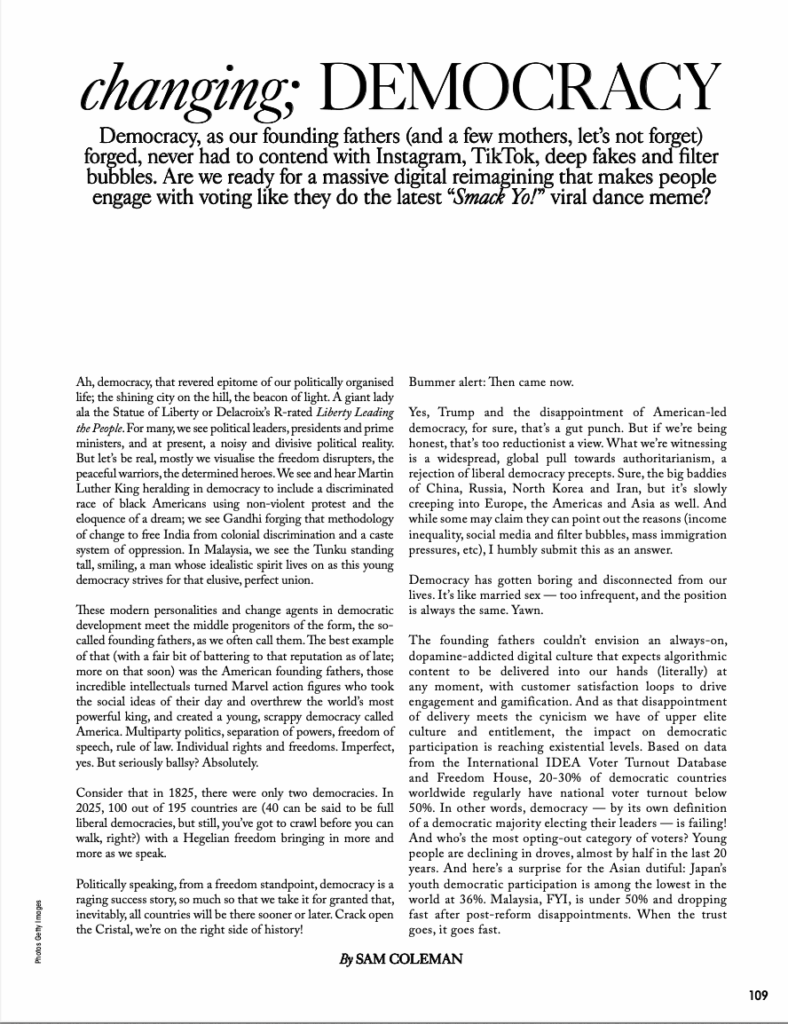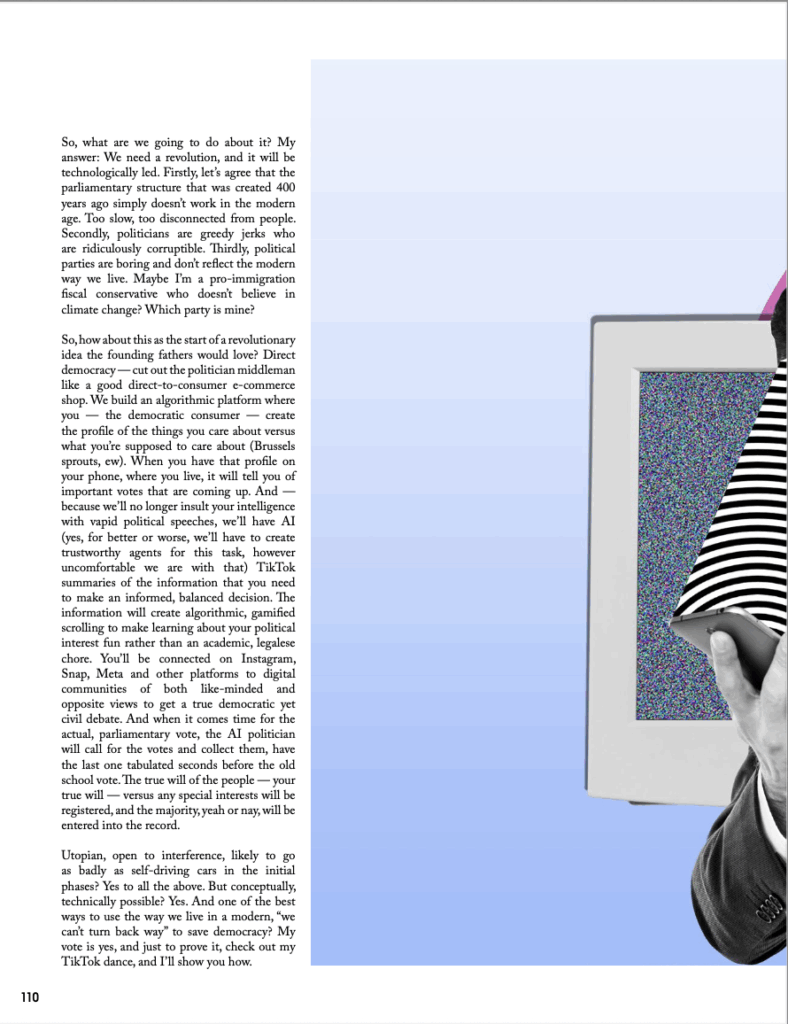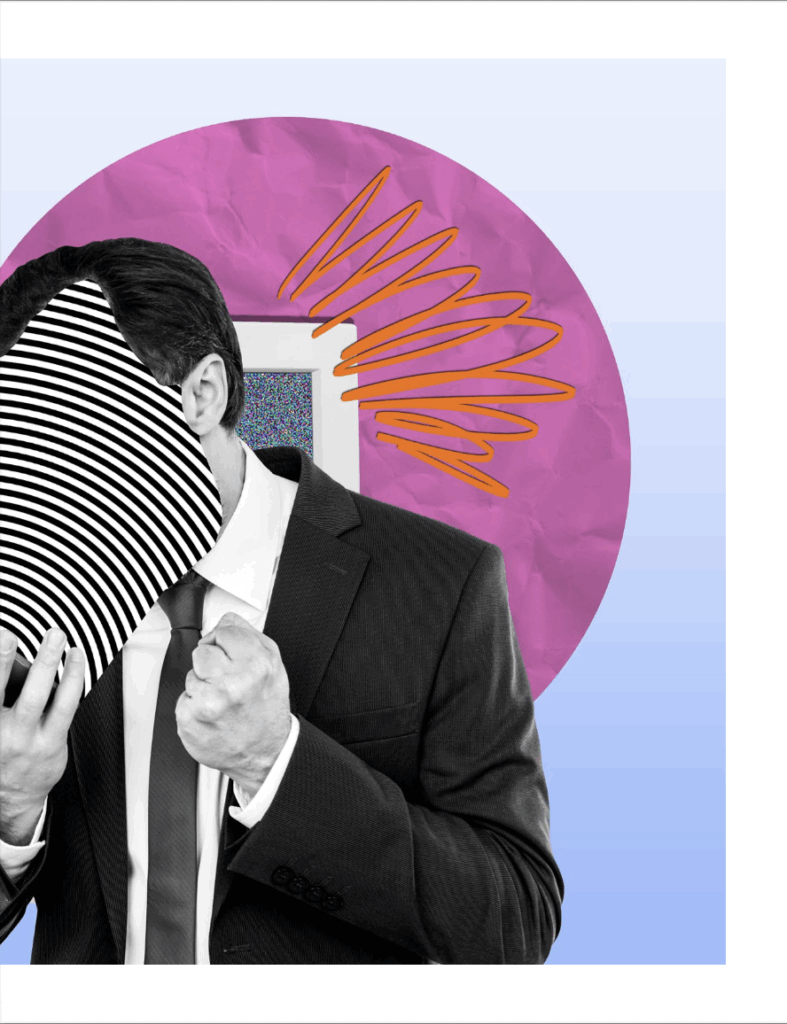Democracy as our founding fathers (and a few mothers let’s not forget) forged it never had to contend with Instagram, TikTok, deep fakes and filter bubbles. Are we ready for a massive digital reimagining that makes people engage with voting like they do the latest Smack Yo! viral dance meme?
Ah democracy, that revered epitome of our politically organised life; the shiny city on the hill ideal, the beacon of light. A giant lady ala the Statue of Liberty or Delacroix’s R rated Liberty Leading the People. For many, we see political leaders, presidents and prime ministers and at present, a noisy and divisive political reality. But let’s be real, mostly we visualise the freedom disrupters, the peaceful warriors, the determined heroes. We see and hear Martin Luther King heralding in democracy to include a discriminated race of black Americans using non-violent protest and the eloquence of a dream; we see Gandhi forging that methodology of change to free India from colonial discrimination and a caste system of oppression. In Malaysia, we see the Tunku standing tall, smiling, a man who’s idealistic spirit lives on as this young democracy strives for that elusive, perfect union.
These modern personalities and change agents in democratic development meet the middle progenitors of the form, the so-called founding fathers as we often call them. The best example of that (with a fair bit of battering to that reputation as of late. More on that soon) were the American founding fathers, those incredible intellectuals turned Marvel action figures who took the social ideas of their day and overthrew the world’s most powerful king and created a young, scrappy democracy called America. Multiparty politics; separation of powers; freedom of speech; rule of law. Individual rights and freedoms. Imperfect, yes. But seriously ballsy? Absolutely.
Consider, in 1825 there were only two democracies. By 2025 100 out of 195 countries are (40 can be said to be full liberal democracies but still, you’ve got to crawl before you can walk right?) with a Hegelian freedom bringing in more and more as we speak.
Politically speaking, from a freedom standpoint, democracy is a raging success story, so much so that we take it for granted that, inevitably, all countries will be sooner or later. Crack open the Cristal, we’re on the right side of history!
Bummer alert: Then came now.
Yes, Trump and the disappointment of American led democracy, for sure that’s a gut punch. But if we’re being honest that’s too reductionist a view. What we’re witnessing is a widespread, global pull towards authoritarianism, a rejection of liberal democracies precepts. Sure the big baddies of China, Russia, North Korea and Iran but it’s slowly creeping in to Europe, the Americas and Asia as well. And while some may claim they can point out the reasons (income inequality, social media and filter bubbles, mass immigration pressures etc) I humbly submit this as an answer.
Democracy has gotten boring and disconnected from our lives. It’s like married sex, too infrequent and the position is always the same. Yawn.
The founding fathers couldn’t envision an always-on, dopamine addicted digital culture that expects algorithmic content to be delivered into our hands (literally) at any moment with customer satisfaction loops to drive engagement and gamification. And as that disappointment of delivery meets the cynicism we have of upper elite culture and entitlement, the impact on democratic participation is reaching existential levels. Based on data from the International IDEA Voter Turnout Database and Freedom House, 20-30% of democratic countries worldwide regularly have national voter turnout below 50%. In other words, democracy—by its own definition of a democratic majority electing their leaders—is failing! And who’s the most opting out category of voters? Young people are declining in droves, almost by half in the last 20 years. And here’s a surprise for the Asian dutiful: Japan’s youth democratic participation is among the lowest in the world at 36%. Malaysia FYI is under 50% and dropping fast after post-reform disappointments. When the trust goes, it goes fast.
So what are we going to do about it? My answer: we need a revolution and it will be technologically led. Firstly, let’s agree that the parliamentarian structure that was created 400 years ago simply doesn’t work in the modern age. Too slow, too disconnected from people. Secondly, politicians are greedy jerks who are ridiculously corruptible. Thirdly, political parties are boring and don’t reflect the modern way we live. Maybe I’m a pro-immigration fiscal conservative who doesn’t believe in climate change? Which party is mine?
So, how about this as the start of a revolutionary idea the founding fathers would love? Direct democracy, cut out the politician middle-man like a good direct to consumer ecommerce shop. We build an algorithmic platform where you—the democratic consumer—create the profile of the things you care about vs what you’re supposed to care about (brussel sprouts, ew). When you have that profile on your phone, where you live, it will tell you of important votes that are coming up. And—because we’ll no longer insult your intelligence with vapid political speeches, we’ll have AI (yes, for better or worse we’ll have to create trustworthy agents for this task, however uncomfortable we are with that) TikTok summaries of the information that you need to make an informed, balanced decision. The information will create algorithmic, gamified scrolling to make learning about your political interest fun rather than an academic, legalese chore. You’ll be connected on Instagram, snap, meta and other platforms to digital communities of both like minded and opposite views to get a true democratic yet civil debate. And when it comes time for the actual, parliamentary vote, the AI politician will call for the votes and collect them, have the last one tabulated seconds before the old school vote. The true will of the people—your true will—versus any special interests will be registered and the majority, yeah or nay, will be entered into the record. Utopian, open to interference, likely to go as badly as self driving cars in the initial phases? Yes to all the above. But conceptually, technically possible? Yes. And one of the best ways to use the way we live in a modern, we can’t turn back way to save democracy? My vote is yes and just to prove it, check out my TikTok dance and I’ll show you how.


